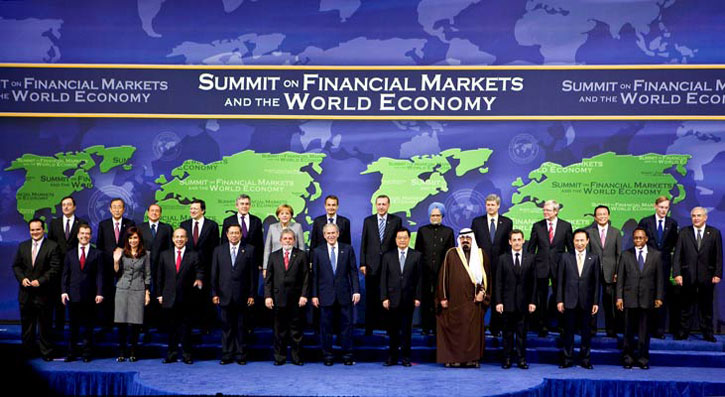As I was catching up on my global governance reading – yes, this is what I do at the beach – I came across a study by by two Brookings scholars – Homi Kharas and Domenico Lombardi on the G20 Leaders Summit. Homi Kharas is a senior fellow and the deputy director for the Global Economy and Development Program at Brookings and Domenico Lombardi is a senior fellow and in the same Brookings program. The piece “The Group of Twenty: Origins, Prospects Challenges for Global Governance” is worth reading and provides excellent detail on the work of previous G20 ministerials and the the more current G20 leader summits. The study appears to have emerged in August though it also seems to have been written prior to the Los Cabos G20 Leaders Summit. No matter.
What remains interesting are the conclusions the two authors draw on this relatively new “high table” of global governance The fact is experts continue to struggle to comprehend fully the influence of this new global summitry institution and to determine moreover its effectiveness. It would seem that the two authors see the G20 as more “effective” than the predecessor G8 but they continue to dwell on its shortcomings especially with respect to representation and legitimacy. I would also suggest that the authors still struggle to understand where the G20 has most effectively moved the yardsticks of global governance.
So how do they see this new global summitry “beast”:
As we look back, however, there is a sense that, although the G-20 was quite effective as a crisis manager, its effectiveness as an enduring facilitating framework for international cooperation has proved mixed at best. … The G-20 does not operate on the basis of setting specific goals, financial commitments or timelines in the same fashion as the G-8. That is because it has organized itself as a process-oriented forum [emphasis added] for first helping to build a consensus and then providing the required political momentum to ensure implementation. … In fact, those decisions are being made through an engagement with other forums and treaty-based institutions where there are established governance procedures for representation and voice. … For the time being, the G-20 appears to be the “best available option” for global economic governance. It is not designed to achieve institutional legitimacy per se, and thus it has chosen to work with other bodies that have a more inclusive and universal representation. It is not an implementing body, but it encourages others to rise to the challenge of addressing the issues that its agenda advances. … Leaders who now participate in it are finding ways to demonstrate to their own electorates that they are making a difference in the conduct of global affairs through the stance they take at its summit meetings. This link between global and domestic dialogues, and the building of popular support to address global challenges, may yet become the greatest value that the G-20 adds.
I see their first point as significant. Most observers would argue that no matter what else one says about the G20, the early coordinated success of leaders’ efforts to avoid a complete global financial meltdown marks a highpoint in the effectiveness of the organization.
So the G20 is an effective crisis manager. But it may not be true at all. While the G20 effectively steered the global economy away from the abyss, thereafter it has proven itself to be a rather feeble crisis manager. In fact the insistent intrusion of the eurozone crisis has significantly distracted and sapped the Leaders Summit. Ambiguity surrounding its role in the crisis and the German determination to enforce austerity has motivated the eurozone and then the G20 to “kick the can down the road” as many experts have commented on. G20 Leaders have found themselves unable to “move the yardsticks” on this crisis but – and more importantly – the Leaders have found themselves unable to redirect the agenda firmly toward to big item crisis prevention matters. Both the French and Mexican agendas have largely been jettisoned. So the G20 is has foundered between the Scylla of crisis management and the Charybdis of crisis prevention. And it appears that is where we sit today.
As for the debate over institutionalization. Well as I have pointed out in the past – I am not attracted to to the formal treaty-based structural forms of global governance. And even if I was – it ain’t going to happen. But for experts and officials closer in to the reality of the Bretton Woods and UN system of institutions, the allure is just too great. And that is certainly where the authors are, looking for integration with a reformed IMF, etc., etc. But even though irresistibly drawn to formal institutions they go part way by pointing to the engagement with these formal treaty bound institutions. But in fact the tasking by the G20 with the Bretton Woods institutions such as the IMF and the transgovernmental regulatory networks – FSB, IOSCO, BCBS, etc., is not only engagement but creation of a new structural architecture of formal and informal institutions. It is all of one piece gents as I’ve argued in the “Iceberg Theory” of global governance.
Messy but effective possibly – as long as the G20 shifts from crisis to prevention. And on that score we are not there yet. So put your measuring instruments aside.
Image Credit: TrendingAddict.com – Washington G20 Leaders Summit 2008


